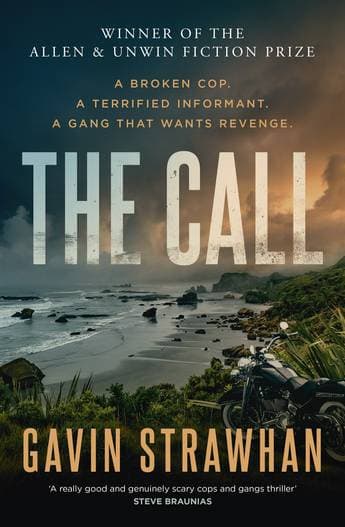Review — The Call by Gavin Strawhan
Reviewed by Ruth Shaw
Gavin Strawhan's debut novel, winner of the Allen and Unwin Fiction Prize for 2023, is so action-packed that it starts without us. We need to get caught up quickly or get left behind in a squeal of tyres and motorcycle exhaust. Detective Sergeant Honey Chalmers has reluctantly returned to her childhood home while she is recovering from injuries mental and physical sustained during a brutal attempted murder, a failed drug bust, and the horrible fear that she is responsible for another woman's death. The man everyone blames for her little sister's suicide is back in town, and a sinister black BMW is hanging around. That's enough to be going on with.
In Waitutū, a coastal settlement populated by small-town lingerers and empty million-dollar baches, Honey's physical wounds continue their welted, imperfect healing. Her mother, Rachel, is sliding into dementia, an unpredictable decline marked by episodes of blankness and anger. But Honey is worried about another woman, another mother. Kloe is the partner of a violent, low-level gang member. One night, looking for sympathy and a shoulder to cry on, Kloe calls Honey's mobile phone, beginning a sequence of events that will tear lives apart and drag a murderous gang into the heart of Honey's hometown.
Strawhan's novel is cinematic, which comes as no surprise given his previous writing credits. The co-creator of Go Girls and Nothing Trivial, he also has form in the TV crime thriller genre, including Bad Mothers and This Is Not My Life. While The Call doesn't read like a screenplay, it could easily become one. Its contrasting landscapes – inner Auckland, the rain-soaked cliffs and bush of Waitutū, a tense set-piece at the Rotorua Luge – are evocative scenery. The scenes are sharp, ending with an eye to the cut: a wry line and then a clean shift to a deserted beach, a flashback, or a suburban gang house.
The gang activity is equally cinematic in its intensity, but gangland executions and busy methamphetamine rings are not fiction. Gun violence and multinational drug smuggling do happen in Henderson, just as gang members do live in nice suburban houses nearby. Strawhan's angle is to centre it around the women and children: how easy it is to drift into that world through a parent, a boyfriend or a drug habit, none of which will let you walk away if you change your mind. The novel, not unusually for a crime thriller, but it bears mentioning, does feature considerable graphic violence, particularly towards women. Sensitive readers should be cautious.
The 'call' of the title refers most apparently to the phone call made by Kloe to Honey, the first of many calls that enmesh the two women – and it is a call for help that Honey can't help but respond to. However, there are other ways the title draws the book's themes into clearer definition. There's Honey's judgement call when dealing with Kloe, her wavering professionalism that involves her too deeply in gang business. There is the call of home; Honey is pulled back to the small town she couldn't wait to leave because of the urgency of family ties. Her mother needs her perhaps for the first time ever, and Honey, injured and confused, also requires the familiarity of her childhood house and family. There is also Honey's vocation, the call to action, which is her sense of responsibility for Kloe's fate. The novel revolves around these conflicting and powerful demands on Honey and will ultimately result in what she is called to do about it.
In Honey, we have an interesting, smart and flawed protagonist who would be welcome to appear in future novels taking on other cases; that isn't necessarily set up by the book's dramatic ending, but there is plenty of material in Honey's character to carry her story on into sequels. That's if Strawhan isn't already turning The Call into his next award-winning miniseries.
Reviewed by Ruth Shaw
